Related Research Articles

"Heroes" is the twelfth studio album by the English musician David Bowie, released on 14 October 1977 through RCA Records. Recorded in collaboration with the musician Brian Eno and the producer Tony Visconti, it was the second release of his Berlin Trilogy, following Low, released in January the same year, and the only one wholly recorded in Berlin. Sessions took place in mid-1977 after Bowie completed work on Iggy Pop's second solo album Lust for Life. Much of the same personnel from Low returned for "Heroes", augmented by the King Crimson guitarist Robert Fripp.
The "Alabama Song"—also known as "Moon of Alabama", "Moon over Alabama", and "Whisky Bar"—is an English version of a song written by Bertolt Brecht and translated from German by his close collaborator Elisabeth Hauptmann in 1925 and set to music by Kurt Weill for the 1927 play Little Mahagonny. It was reused for the 1930 opera Rise and Fall of the City of Mahagonny and has been recorded by the Doors and David Bowie.
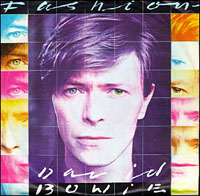
"Fashion" is a song by the English musician David Bowie from his 14th studio album Scary Monsters (1980). Co-produced by Bowie and Tony Visconti and recorded from February to April 1980 at New York and London, it was the last song completed for the album. Originating as a reggae parody titled "Jamaica", "Fashion" is a post-punk, dance and funk track structurally similar to Bowie's "Golden Years". King Crimson guitarist Robert Fripp contributed lead guitar.
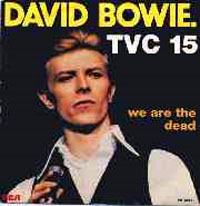
"TVC 15" is a song by the English musician David Bowie, released on his 1976 album Station to Station. RCA Records later released it as the second single from the album on 30 April 1976. The song was recorded in late 1975 at Cherokee Studios in Los Angeles. Co-produced by Bowie and Harry Maslin, the recording featured guitarists Carlos Alomar and Earl Slick, bassist George Murray, drummer Dennis Davis, pianist Roy Bittan and Warren Peace on backing vocals. The upbeat song is mostly art rock performed in a style reminiscent of the 1950s. Lyrically, the song concerns a character's girlfriend being eaten by a television set. It was inspired by a dream of Iggy Pop's and Bowie's role in The Man Who Fell to Earth (1976). Some lyrics are also influenced by the Yardbirds and Kraftwerk.

"Beauty and the Beast" is a song by David Bowie, the first track on his 1977 album "Heroes". It was issued as the second single from the album in January 1978, becoming a minor UK hit, peaking at No. 39 on the UK Singles Chart.

"Scary Monsters (and Super Creeps)" is a song by the English singer-songwriter David Bowie, released as the title track of his 1980 album Scary Monsters (and Super Creeps). It was also issued as the third single from that album in January 1981. Coming as it did in the wake of two earlier singles from Scary Monsters, "Ashes to Ashes" in August 1980 and "Fashion" in October the same year, NME critics Roy Carr and Charles Shaar Murray labelled its release another instance "in the fine old tradition of milking albums for as much as they could possibly be worth". The song was subsequently performed on a number of Bowie tours.
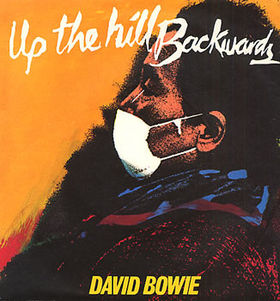
"Up the Hill Backwards" is a song by the English musician David Bowie, released on his 1980 album Scary Monsters . It was later issued by RCA Records as the fourth and final single from the album in March 1981. Originally written under the title "Cameras in Brooklyn", the song was recorded between February and April 1980 at the Power Station in New York City and Good Earth Studios in London. The recording features backing vocalists, guitar contributions from Robert Fripp and acoustic guitar played by co-producer Tony Visconti. Lyrically, the song concerns the struggles of facing a crisis, partially influenced by Bowie's divorce from his wife Angie. Musically, the song contains numerous time signature changes and a Bo Diddley-inspired beat.
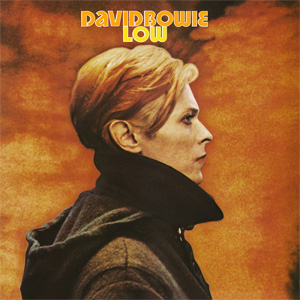
The Berlin Trilogy consists of three studio albums by English musician David Bowie: Low, "Heroes" and Lodger (1979). Bowie recorded the albums in collaboration with English musician Brian Eno and American producer Tony Visconti. The trilogy originated following Bowie's move from Los Angeles to Europe with American singer Iggy Pop to rid themselves of worsening drug addiction. Influences included the German krautrock scene and the recent ambient releases of Eno.
"The Width of a Circle" is a song written by the English musician David Bowie in 1969 for his 1970 album, The Man Who Sold the World. Recorded during the spring of 1970, it was released later that year in the United States and in April 1971 in the UK. The opening track on the album, it features hard rock and heavy metal overtones. Bowie had performed a shorter version of the song in concerts for several months before recording it.
"The Supermen" is a song written by the English singer-songwriter David Bowie in 1970 and released as the closing track on the album The Man Who Sold the World. It was one of a number of pieces on the album inspired by the works of literary figures such as Friedrich Nietzsche and H. P. Lovecraft.
"Panic in Detroit" is a song written by the English singer-songwriter David Bowie for the album Aladdin Sane in 1973. Bowie based it on his friend Iggy Pop's descriptions of revolutionaries he had known in Michigan and Pop's experiences during the 1967 Detroit riots. Rolling Stone magazine called the track "a paranoid descendant of the Motor City's earlier masterpiece, Martha and the Vandellas' "Nowhere to Run"".
"Big Brother" is a song written by David Bowie in 1973 and intended for his never-produced musical based on George Orwell's Nineteen Eighty-Four. In 1974 it was released on the album Diamond Dogs. It segued into the final track on the record, "Chant of the Ever Circling Skeletal Family".

"Stay" is a song by the English musician David Bowie, released on his 1976 album Station to Station. The song was recorded in late 1975 at Cherokee Studios in Los Angeles. Co-produced by Bowie and Harry Maslin, the recording featured guitarists Carlos Alomar and Earl Slick, bassist George Murray, drummer Dennis Davis, pianist Roy Bittan and Warren Peace on percussion. The track features prominent dual guitar work from Slick and Alomar, who mostly composed it in the studio. Based on the chord structure of "John, I'm Only Dancing (Again)", a funk reworking of "John, I'm Only Dancing" (1972), "Stay" emulates funk rock, soul and hard rock. The song's lyrics are abstract and relate to love.
"Blackout" is a song written and recorded by David Bowie in 1977 for the album "Heroes". Author Nicholas Pegg described the track as "typical of the darkly exhilarating sonic schizophrenia of the "Heroes" album", while biographer David Buckley remarked on "a backing verging on industrial". Regarding its lyrics and subject matter, Bowie himself said in 1999 that the song "did indeed refer to power cuts. I can't in all honesty say that it was the NY one [New York City blackout of 1977], though it is entirely likely that that image locked itself in my head."
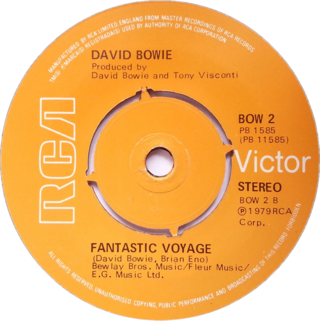
"Fantastic Voyage" is a song written by David Bowie and Brian Eno for the 1979 album Lodger. It has almost exactly the same chord sequence as "Boys Keep Swinging", from the same album. It has also appeared as the B-side to the "Boys Keep Swinging" and "Peace on Earth/Little Drummer Boy" singles, and the US edition of "D.J.".

"Look Back in Anger" is a song written by English artists David Bowie and Brian Eno for the album Lodger (1979). It concerns "a tatty 'Angel of Death'", and features a guitar solo by Carlos Alomar.
"It's No Game" is a song written by English musician David Bowie for his 1980 album Scary Monsters , featuring lead guitar played by Robert Fripp. The song is split into two parts, opening and closing the album. "(No. 1)" is musically sinister, featuring Bowie screaming lyrics and Japanese narration provided by actress Michi Hirota. "(No. 2)", a stark contrast to "(No. 1)", is much calmer, which Bowie's biographers symbolise as Bowie facing the same situation in "(No. 1)", but after the album's duration.
"Teenage Wildlife" is a song written by David Bowie in 1980 for the album Scary Monsters . Running at almost seven minutes, the song was the longest track on Scary Monsters, and Bowie's longest composition since "Station to Station" (1976), although it was surpassed in length by later tracks such as 2003's "Bring Me the Disco King" and 2016's "Blackstar".
"Scream Like a Baby" is a song written by David Bowie. It appears on the 1980 album Scary Monsters .

"Ashes to Ashes" is a song by the English singer-songwriter David Bowie from his 14th studio album, Scary Monsters (1980). Co-produced by Bowie and Tony Visconti, it was recorded from February to April 1980 in New York and London and features guitar synthesiser played by Chuck Hammer. An art rock, art pop and new wave song led by a flanged piano riff, the lyrics act as a sequel to Bowie's 1969 hit "Space Oddity": the astronaut Major Tom has succumbed to drug addiction and floats isolated in space. Bowie partially based the lyrics on his own experiences with drug addiction throughout the 1970s.
References
- 1 2 O'Leary 2019, p. 85.
- ↑ "David Bowie – The 100 Greatest Songs". Mojo . No. 255. February 2015. p. 54.
- ↑ Buckley 1999, p. 320.
- ↑ Carr & Murray 1981, p. 92.
- 1 2 "Alabama Song 40th anniversary picture disc". David Bowie. 19 December 2019. Retrieved 2020-05-07.
- ↑ Pegg 2016, p. 142.
- ↑ "Ouvrez Le Chien streaming next week". David Bowie Official Website. 25 June 2020. Archived from the original on 31 October 2020. Retrieved 23 December 2020.
Sources
- Buckley, David (1999). Strange Fascination – David Bowie: The Definitive Story. London: Virgin Books. ISBN 978-1-85227-784-0.
- Carr, Roy; Murray, Charles Shaar (1981). Bowie: An Illustrated Record. London: Eel Pie Publishing. ISBN 978-0-38077-966-6.
- O'Leary, Chris (2019). Ashes to Ashes: The Songs of David Bowie 1976–2016. London: Repeater Books. ISBN 978-1-91224-830-8.
- Pegg, Nicholas (2016). The Complete David Bowie (revised and updated ed.). London: Titan Books. ISBN 978-1-78565-365-0.